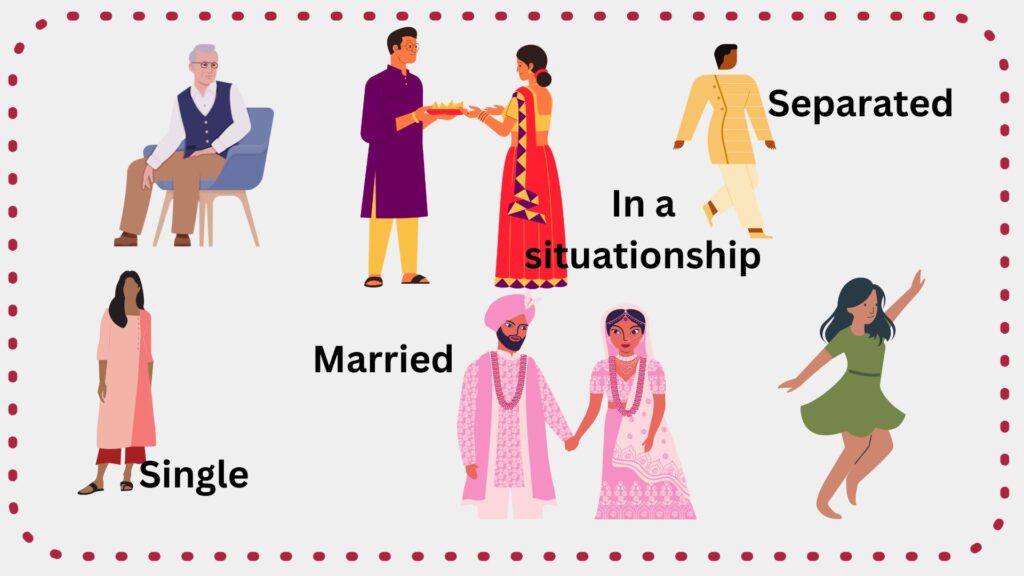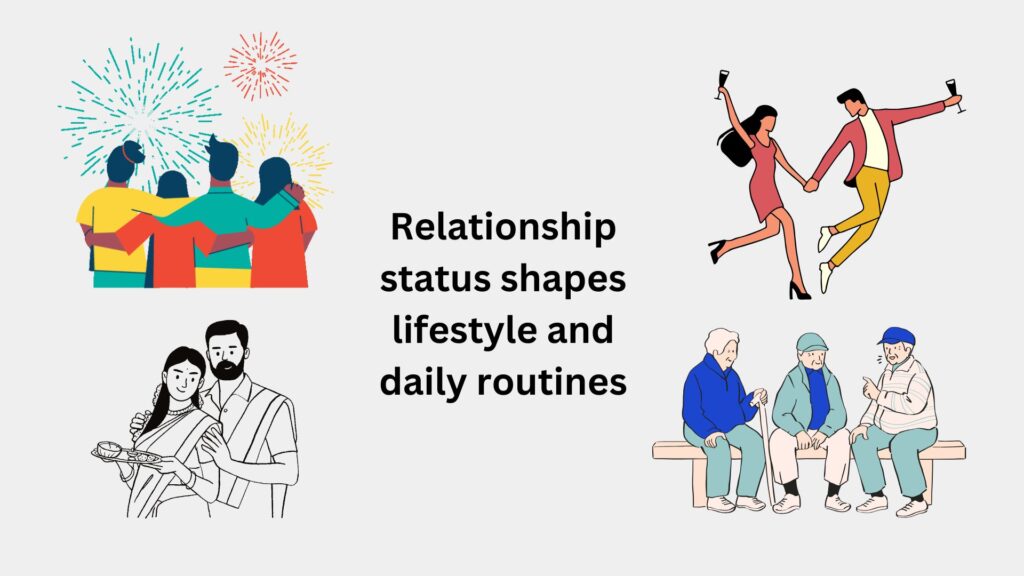
She’s changed her status to single on Facebook. Does it mean she’s broken up with her boyfriend?
Relationship Status Explained: How Does It Impact One’s Personal Life and Others’ Perceptions?
Relationship status is a pervasive term in contemporary society. It is a label we apply to ourselves and others, defining our romantic or intimate connections. But what does one’s relationship status truly signify? Beyond a simple description, relationship status carries weight, influencing not only an individual’s personal life but also shaping how they are perceived by the world around them. This article will delve into the multi-layered meaning of relationship status and explore its deep impact on personal experiences and social perceptions.
Defining Relationship Status
Relationship status is basically a declaration of one’s romantic or marital standing. Traditionally, it has included categories such as single, married, divorced, or widowed. However, as societal norms evolve, the spectrum of relationship statuses has broadened to include more nuanced descriptions such as ‘in a relationship’, ‘engaged’, and ‘separated’.
These days there are even more open-ended labels like, ‘it is complicated’ or ‘open relationship’.
Kamal, relationship expert
Singlehood: Freedom and Self-Discovery
Being single is often associated with independence and self-discovery. For some, it is a deliberate choice to focus on personal growth or hobbies. For others, it may be a transitional phase while seeking a compatible partner. Singlehood can be empowering, allowing individuals to explore their interests and build a strong sense of self. However, it can also be accompanied by societal pressure, particularly in cultures that place a high value on romantic partnerships.
In a Relationship: Connection and Commitment
Being in a relationship typically implies emotional and sometimes physical intimacy with another person. This status can bring a sense of stability and companionship. Nevertheless, it requires effort, compromise, and communication to maintain a healthy partnership. For many, being in a relationship is a source of happiness and fulfilment, but it can also lead to challenges such as balancing individual needs with those of the partnership.
Engaged or Married: Long-Term Commitment
Engagement and marriage are often seen as milestones of long-term commitment. These statuses symbolise a deeper level of dedication and are frequently accompanied by legal and social recognition. Marriage, in particular, is seen as a lifelong bond, though modern relationships increasingly embrace flexibility and redefinition. While these statuses can provide a sense of security and shared purpose, they also require ongoing effort to navigate the complexities of shared lives.
Divorced or Separated: Transition and Resilience
Divorce or separation represents a significant life transition. This status often involves emotional upheaval, as individuals navigate the end of a partnership and adjust to a new reality. However, it can also be a period of resilience and self-renewal. For many, divorce or separation is an opportunity to reassess personal goals and priorities, though it may also carry societal stigma or feelings of failure.
We have explained relationship status in the previous paragraphs. These classifications serve as shorthand in social interactions, quickly conveying information about an individual’s availability for romantic involvement and commitment to a partnership. However, it is vital to recognise that relationship status is more than just a convenient label. It is a social construct steeped in cultural expectations and varying degrees of emotional investment. The meaning attached to each status can differ significantly based on individual beliefs and personal experiences. For some, being ‘married’ represents a sacred vow and a cornerstone of life, whereas for others, being ‘single by choice’ signifies independence.
Impact on Personal Life
The declared relationship status of an individual can exert a considerable influence on their personal life, affecting various aspects from emotional well-being to lifestyle choices.

Firstly, relationship status is often intertwined with emotional states. Being in a fulfilling relationship can contribute to feelings of happiness and belonging. Partnerships can offer emotional support and a sense of companionship that can enhance overall well-being. However, relationship status can also be associated with negative emotions. Feeling lonely while single, experiencing heartbreak after a break-up, or navigating the complexities of a difficult marriage can all take a toll on emotional health. It is important to acknowledge that relationship status is not a direct determinant of happiness; individuals can find contentment and fulfilment in various relationship statuses.
Secondly, relationship status frequently shapes lifestyle and daily routines. Living arrangements, financial responsibilities, location of stay, and social activities are organised around one’s relationship status. Couples make joint decisions about housing, finances, social connections, and leisure time, leading to shared lifestyles. Single individuals may have greater autonomy in these areas but might bear sole responsibility for household management and financial planning. Couples may socialise with other couples, while single individuals might gravitate towards different social groups or activities targeting single lifestyles. Decisions about family planning, career choices, entertainment options, and even personal habits can be affected by one’s relationship status and the presence or absence of a partner.
Last New Year’s eve, I had the option of going out partying with my friends or staying at home and catching up on my sleep. I chose the latter. It was a revelation to me that I had grown old and activities that excited me when I was single and that excite me now in my 30s are different.
Robert, Copy writer, Mumbai
Finally, relationship status can play a role in personal growth and identity formation. Being in a relationship can help personal development through shared experiences, mutual support, and the navigation of interpersonal dynamics. Partnerships can provide opportunities to learn about compromise and commitment, contributing to emotional maturity and self-awareness. That said, being single can offer a space for self-discovery and the exploration of individual passions and goals without the constraints of a partnership. Both being in and out of a relationship offer unique pathways to personal growth, and relationship status is not always indicative of personal development or its absence.
Impact on Others’ Perceptions
Beyond the personal sphere, relationship status impacts how individuals are perceived by others and by society at large. Stereotypes and social judgements are frequently attached to different relationship statuses.
Society holds expectations regarding relationship status, particularly concerning marriage and long-term partnerships. There can be societal pressure to be in a relationship, especially as individuals reach certain ages. Single individuals, particularly women in some cultures, may face unwarranted questions or assumptions about their lives or choices. Conversely, marriage is often viewed as a marker of success and stability, providing a certain social status and acceptance. These societal norms can create pressure to conform to particular relationship statuses, regardless of personal desires or circumstances.
Stereotypes and judgements are also commonly associated with different relationship statuses. Single individuals might be stereotyped as lonely, incomplete, or overly focused on their careers. Divorced individuals may face stigma or assumptions about relationship failures. Widowed individuals may be pitied or perceived as vulnerable. Couples, especially married couples, may be viewed as settled and responsible. These stereotypes are oversimplified and inaccurate, failing to recognise the diversity of experiences and personalities within each relationship status category. Such judgements can influence professional opportunities and even personal relationships with friends and family.
Being a single mother is a difficult proposition in the Tier 3 city that I live in. People assume I am sexually available.
Nimisha, government employee, Tenali
Cultural and generational factors play a significant role in shaping perceptions of relationship status. In some cultures, marriage is highly valued and seen as a prerequisite for adulthood, while in others, singlehood or cohabitation is more widely accepted. Generational differences also influence attitudes, with younger generations often embracing diverse relationship models and older generations adhering to more traditional views.
We were expected to arrive with a date for many of the parties and social events at university. So, even if we were not interested in a relationship, we paired up with someone for the duration of our course. These were casual relationships and did not mean anything.
Geetha, former MBA student, pune
Furthermore, relationship status can subtly affect social inclusion and networking opportunities. In some social settings, couples may be more readily included in social gatherings or events. Single individuals might feel excluded or overlooked in contexts where couple-centric norms prevail. Networking events or social circles might sometimes be structured in ways that favour or prioritise individuals in certain relationship statuses. While these effects are subtle, they highlight the pervasive influence of relationship status on social dynamics and perceptions.
My office, which is generally open-minded about many things, held a sex and pleasure based talk by a prominent gynaecologist in the city. I was disappointed that the talk was geared towards the married women attending it.
Suhaira, archivist, Gurgaon
Conclusion
Relationship status is far more than a mere label; it is a complex and multi-layered concept that carries personal and social implications. It influences emotional well-being, shapes lifestyle choices, and contributes to personal growth. Moreover, it significantly affects how individuals are perceived by others and by society, bringing with it social expectations and judgements. Understanding the import of relationship status requires moving beyond simplistic categorisations and recognising the diverse experiences and meanings associated with each status.
Ultimately, it is crucial to appreciate that relationship status is a personal matter with wide-ranging social consequences, and having a nuanced and accepting perspective on the spectrum of relationship statuses is vital for a compassionate and open-minded society. Whether single, partnered, or somewhere in between, each status offers unique opportunities for growth and fulfilment.
Whether you are single and exploring, recovering from a past relationship, or simply looking for a deeper connection, Rematch empowers you to take control of your love life. With tailored matches and insightful resources, we are here to support you every step of the way. Download Rematch today and start your journey towards a relationship that complements your life vision. For more tips on finding and nurturing long-term partnerships, explore our blog and resources, because everyone deserves a love that grows with them.
References
DePaulo, Bella M. Singled Out: How Singles Are Stereotyped, Stigmatized, and Ignored, and Still Live Happily Ever After. New York: St. Martin’s Griffin, 2006.
Fincham, Frank D., and Steven R. H. Beach. “Marriage in the New Millennium: A Decade in Review.” Journal of Marriage and Family 72, no. 3 (2010): 631–49.
Giddens, Anthony. The Transformation of Intimacy: Sexuality, Love and Eroticism in Modern Societies. Cambridge: Polity Press, 1992.
Umberson, Debra, and Marianne B. Thomeer. “Are Married People Healthier? Marital Status, Marital Quality, and Health.” Journal of Health and Social Behavior 55, no. 1 (2014): 23–48.

